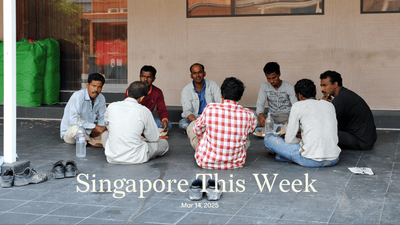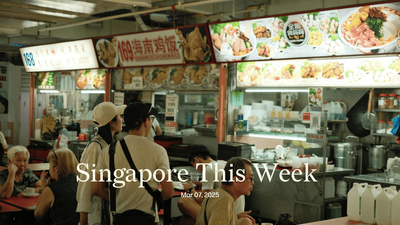Business: Temasek finally comes clean over FTX
On November 17th, over a week after it became clear that FTX, a crypto exchange, would collapse, Temasek, one of two Singaporean sovereign wealth funds, finally published a statement, saying it will write down its cumulative US$275m (S$377m) investment in FTX. Forbes first reported it on November 10th. Many others, including The Online Citizen and The Independent, then highlighted the alleged loss. CNA, TODAY and The Straits Times (ST), by contrast, have been as shady in their reporting as Sam Bankman-Fried (SBF), FTX’s frizzy-haired tech bro. Not a single piece before the statement emphasised what should have been “the lede”. ST’s post-statement article is just a rehash, without any critical analysis. Temasek claims to support "high calibre, experienced and diverse boards" in its portfolio companies. But FTX had a grand total of three directors, including SBF. Did Temasek conduct adequate due diligence? Among other oddities, FTX’s chief regulatory officer was a lawyer who had previously tried to cover up an online gambling cheating scandal. Notwithstanding structural differences between the two, contrast Temasek’s dithering and opacity with the Ontario Teachers’ Pension Plan, which on November 10th published a statement about its US$75m investment in FTX, which in turn invited commentaries from critics. The larger point here is not about judging a single tech investment—that’s a crapshoot. Rather, it’s about the need to prompt greater transparency and accountability at Temasek with regards to its entire portfolio and performance, as well as executive compensation. Temasek’s sole shareholder is the government, which means it invests Singaporeans’ money. SBF fooled many smart people. Temasek probably thinks it’s fooling many stupid ones.
(Note: another FTX blurb below deals with the regulatory muddle.)
Business: Elites don’t want you to know how much they earn
Only slightly more than half of publicly listed companies polled in Singapore disclose executive compensation, according to a survey by the Singapore Institute of Directors (SID). Worse, a separate KPMG study found that only five percent fully disclose the entire remuneration of their directors and CEOs. The main reason for not doing so, according to 87 percent of respondents in the SID survey, is confidentiality. Some 94 percent of them do not intend to do so in the next two years. Countries such as Hong Kong, Malaysia, the UK and the US mandate the full disclosure and breakdown of executive compensation. Not Singapore, where it is merely recommended by the Code of Corporate Governance. This points to the inadequacies in Singapore of “recommendations” and “codes”, which are easily ignored. It also, as Alvin Chiang, a consultant from advisory firm Russell Reynolds Associates, told ST, alludes to the passive nature of investors here. Finally, it’s also in keeping with the broader secrecy of the elite in Singapore. Many executives in listed firms, including the Temasek-linked ones, are former politicians with the ruling party. Singapore, unlike many other democracies, does not require asset declarations from its politicians (something seen as necessary to stem corruption and cronyism). No surprise that business honchos also want to hide their millions.
Society: Malays are more effectively bilingual than the rest
Malays have the highest bilingual literacy in Singapore, say academics from the Singapore University of Social Services (SUSS). They reckon it’s because Malays’ shared religion and culture have cemented their mother tongue in the community. They suspect that the Chinese remain divided in their language of choice—the older generation speak Mandarin and other dialects, while those who resist stick to English. As to why Tamil is less widely used, they reason that it’s due to new immigrants bringing a variety of languages from India to Singapore. Supporting these findings are data from the Singapore Department of Statistics’ 2020 Population Census. The government has long extolled the importance and benefits of bilingualism, entrenching it in the nation’s education system. But it’s been a strict bilingualism, in keeping with the archaic CMIO (Chinese-Malays-Indian-Others) ethnic categorisation, one which forced ethno-linguistic stereotypes onto individuals in a diverse, global city. Lee Hsien Loong, prime minister, has said that languages would “strengthen our cultural roots, which is core to our Singaporean identity.” But was the prioritisation of Mandarin over dialects, whatever its merits, the very thing that prevented these bilingual roots from strengthening? That Malays have been the most comfortable with bilingualism suggests that Singapore’s overly pragmatic, technocratic approach to language—seen more as a tool of economic productivity than cultural ballast that gives meaning to life—may be counter-productive. Moreover, as Singapore, a city in the middle of the Malay world, engages more with its immediate neighbours, it’s probably wise for all of us, both for reasons of belonging and practicality, to learn a bit more of our national language. Jom belajar.
Society: The right to ride costs three times the ride
Singapore’s vehicle quota system to manage traffic might have become a victim of its own success: COE (certificate of entitlement) prices hit a record high this month. Motorcycle premiums (S$13,189), for instance, now cost three times more than that of an entry-level bike. Dealers and experts say that these exorbitant prices are due to a shortage of COEs—the supply being “far too low” to meet demand, said Rex Tan, Singapore Motor Cycle Trade Association president. The popularity of delivery services—like for food and groceries—since the pandemic began, has boosted the need for motorcycle ownership. But many potential buyers, especially from lower-income groups, are likely being priced out of the bidding system or from purchasing a COE. Not having their own vehicle reduces their ability to earn a decent living as a delivery rider. The other option is to rent, but this places them at the mercy of rental or platform companies, further limiting their independence and earning capacity. Those in the industry have encouraged the government to increase the number of COEs available in the motorcycle category, which would not only drive prices down, but allow more self-employed gig workers, dependent on a two-wheeler for their livelihoods, to continue plying the roads. Besides, motorbikes take up less space, and those who require them for carrying out delivery services have become an essential part of living with Covid.
Arts: The Change
What does hope look like in an era of climate despair? “The Change” looks to explore this question along with themes of friendship, care, and intergenerational trauma. The one-man play is performed by Dennis Sofian and written, produced, and directed by Edward Eng. It is also the first performance presented through Eng’s collaboration called Gangguan!, a vessel for artists to pursue plays with less commercially viable themes that are unlikely to qualify for government grants. “The Change” is on from December 7th-11th at Cairnhill Arts Centre. Tickets are available via Eventbrite.
Arts: Dyseuphoria
This is the last weekend to catch “Dysphoria/Euphoria”, an art exhibition presented by TransBefrienders and Rainbow Families Singapore in conjunction with Transgender Awareness Week. The exhibition features works by eight local trans and gender-diverse artists like Worms Wav, Stephanie Dogfoot and Marla Bendini, as well as video interviews of individuals sharing their experiences with transition and gender dysphoria. The exhibition runs until November 20th at Projector X: Picturehouse (The Cathay). Those interested in Bendini’s work may also head to Cuturi Gallery for her solo exhibition, “From These Ruins, We Rise and Fall”. This exhibition is on until November 27th.
Arts: Joyland
“Joyland”, the first Pakistani film to be shown at the Cannes Film Festival, and the country’s entry to the next Oscars, will not be seen by many Pakistanis. Censors have blocked the national release of a love story between a married man and a transgender woman on the grounds that it does not conform with the “social values and moral standards” of Pakistani society. This reasoning will sound familiar to Singaporean viewers as well, given how films and television shows with “LGBT content”, including “Lightyear” (NC16) and the animated series “She-Ra and The Princesses of Power” (M18), have consistently warranted higher ratings, cuts, or bans here. Singaporean audiences will be able to catch Joyland, however, at the Singapore International Film Festival. It makes its South-east Asian Premiere on December 2nd and is rated R21.
History weekly by Faris Joraimi
We don’t often think of Singapore as an important centre of global Islam. But at the end of the 19th century our city was home to a colourful cast of Muslim miracle-workers, saints, and exiled princes—all soon to be featured in “Singapore Islam: The Prophet’s Port and Sufism Across the Oceans”, an upcoming book by Harvard professor Teren Sevea. In the latest episode of “Akbar’s Chamber”, an Islamic studies podcast hosted by UCLA historian Nile Green, Sevea painted a rich picture of colonial Singapore’s diverse, urbane and cosmopolitan Muslim society. Comprising Tamils, Javanese, Malays, Arabs and Jawi Peranakans, among others, they were connected to Islamic centres abroad, such as Cairo and Istanbul, by the steamship and printing press. Some were friends with the era’s famous Arab reformers, including Egyptian journalist Muhammad Abduh. Complicating popular perceptions of a single Muslim orthodoxy, Sevea highlighted minority sects and organisations. He also explored lesser-known personalities, such as the Pakistani spiritual master Maulana Abdul Aleem Siddique, who came to Singapore and in 1932 set up the charity known today as the Muslim Missionary Society (Jamiyah). The globetrotting Maulana once found himself in Mombasa (in today’s Kenya) debating religion with the Irish playwright George Bernard Shaw. You can find the podcast on Spotify.
Tech: Crypto in chaos as FTX crashes
FTX’s collapse follows other crypto casualties such as Three Arrows Capital and Terra Luna. The root cause of the implosion seemed to be that Alameda Research, a hedge fund SBF also ran, had illegally taken customer funds from FTX to meet margin calls for loans which it had taken to invest in digital assets. The exchange’s implosion has resulted in losses for many investors, including many in Singapore. Lightspeed Venture Partners, Sequoia Capital, Sea Group and Singapore's own Temasek are among the top institutional investors that backed FTX. Currently, FTX doesn’t have a licence to operate in Singapore but the Monetary Association of Singapore (MAS) said that “it is not possible, however, to prevent Singapore users from directly accessing overseas service providers. FTX.com was therefore able to onboard Singapore users.” Its rival exchange, Binance, currently has no proper licence to solicit from Singapore users while Coinbase, Crypto.com and Coinhako have already secured MAS approval. In other words, Singapore’s crypto regulations forced out Binance but appeared to instead legitimise FTX, thus sucking in millions from Singaporeans. Regulations also failed to safeguard local investor assets in a local FTX subsidiary, as happened in Japan and the US. These are the two main ongoing regulatory grievances. The collapse of FTX, which had US$9bn (S$12.3bn) in liabilities, signals a need for better regulation. Even then, regulations cannot sufficiently protect consumers from losses arising from the extremely speculative and risky nature of cryptocurrency. Even if MAS appears to have green-lit a firm, and even if Temasek has invested in it, retail investors should be wary and do their own research.
Tech: Atome secures major payment institution licence
Apaylater Financials, also known as Atome, has been granted an in-principle approval by MAS to provide regulated payment services in Singapore. The major payment institution licence will allow Atome to provide domestic and cross-border money transfers, account issuance, and merchant acquisition services. Atome is a buy now, pay later (BNPL) provider that splits the user’s bill into three equal payments over three months. The start-up received US$45m (S$61.5m) from its parent company Advance Intelligence Group in July, and in August entered into a US$100m (S$138.1m) debt facility with HSBC Singapore. Last month, Atome collaborated with the Singapore Fintech Association and other fintech industry players, including Grab and Shopback, to develop a code of conduct for BNPL providers that outlines important industry-agreed standards and safeguards to mitigate the risk of debt accumulation, and protect the interests of BNPL users. Atome is cementing its place in the BNPL scene through its deep collaboration with MAS, its merchant partners, and its customers to ensure that users buy now and pay later responsibly.
Tech: E-commerce goes green: substantive or performative?
Corporations have been trying to offset carbon emissions in line with the growing consciousness of climate change and sustainability issues. Razer, a Singapore-based gaming company, has recently rolled out a carbon-neutral e-commerce checkout solution called Restorify. Razer's feature allows e-commerce players to estimate the carbon footprint of a specific transaction and provide a traceable carbon offset for that purchase. Meanwhile, Zalora, an online fashion retailer, intends to reduce its carbon footprint and promote more sustainable consumption. It has set baselines and targets for 2030, such as using only sustainably sourced cotton for its own brands, fully powering its fulfilment centres and offices with renewable energy, and achieving carbon neutrality in its operations and delivery. In a 2020 Sustainability Report, Zalora acknowledged that it was responsible for emitting 211,886 tonnes of CO2 equivalent, with 62 percent of their total emissions related to the manufacturing of products sold on its site. Zalora’s goal is to have all its packaging incorporate sustainable materials. In 2022, it is 68 percent of the way there. These initiatives from e-commerce players should be welcomed even as we watch out for greenwashing.
If you enjoy Jom’s work, do get a paid subscription today to support independent journalism in Singapore.







